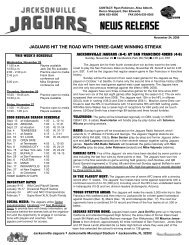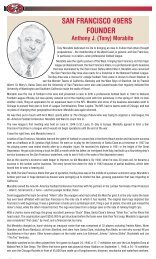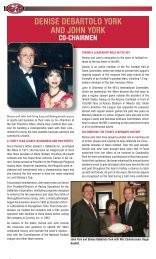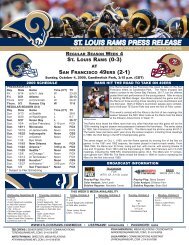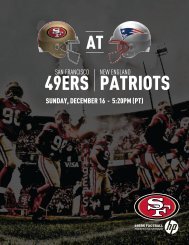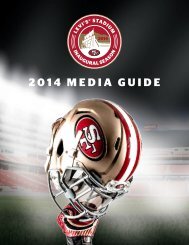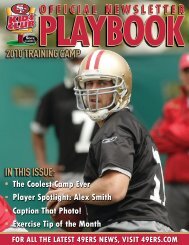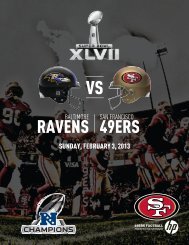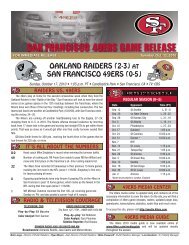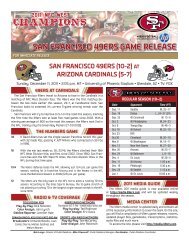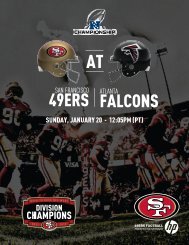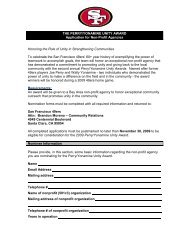1 - Organization-For Print.indd - Parent Directory - NFL.com
1 - Organization-For Print.indd - Parent Directory - NFL.com
1 - Organization-For Print.indd - Parent Directory - NFL.com
You also want an ePaper? Increase the reach of your titles
YUMPU automatically turns print PDFs into web optimized ePapers that Google loves.
HISTORYHISTORICAL HIGHLIGHTSbeaten the Colts in 13 previous games. The 49ersfinished 4-8-2 and five players—HB Jimmy Johnson,LB Dave Wilcox, G Elmer Collett, RB Ken Willardand rookie WR Gene Washington—were selected tothe Pro Bowl. Johnson was also All-Pro and winnerof the Len Eshmont Award.1970This was the greatest year since the club becamea member of the <strong>NFL</strong> in 1950. The team recorded a10-3 record and captured the Western Division (NFC)Championship. QB John Brodie was the <strong>NFL</strong>’S Playerof the Year, CB Bruce Taylor was NFC Rookie of theYear and Coach Dick Nolan was a near-unanimouschoice as NFC Coach of the Year. Brodie, WR GeneWashington, LB Dave Wilcox and HB Jimmy Johnsonwere All-Pro and joined T Len Rohde in the Pro Bowl.1971The 49ers forged a 9-5-0 record and won theirsecond consecutive NFC Western Division title,clinching the crown on the final day by beating Detroit,31-27, the identical score by which the Lionshad knocked the 49ers out of championship play in1957. The season also was the club’s first in its plushnew home, Candlestick Park. C <strong>For</strong>rest Blue, LB DaveWilcox and CB Jimmy Johnson were All-Pro andjoined in the Pro Bowl by TE Ted Kwalick, WR GeneWashington, RB Vic Washington, DE Cedrick Hardmanand CB Bruce Taylor.1972Early-season inconsistency, <strong>com</strong>pounded by an injuryto QB John Brodie in the fifth game of the season,cast appall on the 49ers prospects for a thirdstraightNFC Western Division title, but QB SteveSpurrier stepped in for Brodie and turned thingsaround with a brilliant, poised performance. In thefinal quarter of the final game against Minnesota, therecovered Brodie relieved Spurrier and threw two TDpasses in a 20-17 win over the Vikings. The victoryclinched divisional title number three, but Spurrier’snine-game contribution was the key. C <strong>For</strong>rest Blue,DB Jimmy Johnson, TE Ted Kwalick, WR Gene Washingtonand LB Dave Wilcox were All-Pro selections.1973In what was both a disappointing and significantyear, the 49ers were 5-9 after tackling the <strong>NFL</strong>’stoughest schedule, a rash of key injuries and anunsettled quarterback situation. It also marked theend of the brilliant careers of QB John Brodie and DTCharlie Krueger, both of whom retired at year’s end.C <strong>For</strong>rest Blue and LB Dave Wilcox were voted All-Pro and joined in the Pro Bowl by TE Ted Kwalick, GWoody Peoples and P Tom Wittum.1974The 49ers used five different quarterbacks after aninjury to starter QB Steve Spurrier, a week before theseason opened, sidelined him for most of the year.After winning the first two games, the club lost ateam-record seven straight and then closed with arush, winning four of its last five to finish the season6-8. RB Wilbur Jackson was named The SportingNews ROOKIE OF THE YEAR and was named to the<strong>NFL</strong> All-Rookie team along with QB Tom Owen andDB Mike Holmes. C <strong>For</strong>rest Blue and P Tom Wittumwere All-NFC and selected for the Pro Bowl alongwith HB Jimmy Johnson. A knee injury forced perennialAll-Pro LB Dave Wilcox to retire after a brilliant11-year career with the 49ers.1975A strong defensive performance throughout the seasoncouldn’t offset an erratic offense troubled by anunsettled quarterback situation and a rebuilding offensiveline. The high point of the 5-9 season wasa 24-23 win over Los Angeles to end a 10-gamelosing streak to the Rams. At season’s end, DE CedrickHardman was the club’s first ever two-time LenEshmont Award winner.1976A turnaround year for the 49ers as the team, undercoach Monte Clark, posted an 8-6 record, theirfirst winning season since 1972. With new QB JimPlunkett at the controls, the 49ers got off to theirbest start ever (6-1), before hitting a mid-seasonfour-game losing streak knocking the club out ofplayoff contention. The season saw the emergenceof a powerful defensive unit that led the league inquarterback sacks with 61. RB Delvin Williams seta 49ers single-season rushing record with 1,203yards. DE Tommy Hart was named All-Pro andplayed in the Pro Bowl along with Williams, DECleveland Elam and LB Dave Washington. C RandyCross was an All-Rookie team selection. Hart becamea two-time winner of the Len Eshmont Awardand CB Jimmy Johnson retired after a brilliant 16-year career with the 49ers.1977In the 32nd year of their existence, the 49ers begana new era. On March 31, 1977, the club became theproperty of Edward J. DeBartolo Jr. and came underthe guidance of Joe Thomas as general manager.The changeover was made more dramatic becausethe San Francisco 49ers were one of the few <strong>NFL</strong>franchises which had never previously changedownership or location. On the field, under Coach KenMeyer, the 49ers ran hot and cold. The club lost itsfirst five games, then won five of the next six beforedropping the final three contests to finish 5-9. SSMel Phillips was named winner of the coveted LenEshmont Award. DE Cleveland Elam was selectedAll-Pro and played for the NFC in the Pro Bowl.1978The 49ers suffered through their longest season asthe club fell to 2-14 and three coaches were hiredand fired in less than 12 months. First Head CoachPete McCulley departed after nine games with a 1-8record, and his replacement, Fred O’Connor, was letgo at the end of the year as the team won just one ofits final seven contests. Bill Walsh was hired as thenew coach and general manager. RB Paul Hofer, whoreplaced RB O.J. Simpson when the newly-acquiredstar went to the sidelines for the year with a shoulderinjury, was named recipient of the Len Eshmontaward.SAN FRANCISCO 49ERS \\378// MEDIA GUIDE1979The 49ers suffered through their second consecutive2-14 season, but there were several indications ofimprovement. San Francisco went from virtually theworst-ranked offensive team in the league in ’78to one of the most productive in ’79, ranking first inpassing offense in the NFC and sixth in total offensein the <strong>NFL</strong>. RB Paul Hofer again was the Len EshmontAward recipient and individual leader, racking up 615yards rushing and an additional 662 yards receivingon 58 catches in only seven starts. QB Steve DeBergbroke Fran Tarkenton’s <strong>NFL</strong> record for <strong>com</strong>pletionsby connecting on 347 passes. K Ray Wersching seta club record with an 83.3 field goal percentage andalso led the league with that mark. RB O.J. Simpsonretired from the 49ers and the <strong>NFL</strong>, finishing as thesecond leading rusher of all time with 11,236 yards.1980In their second season of the Bill Walsh era, the49ers showed gradual improvement in their rebuildingprogram. A three-game winning streak to openthe season, <strong>com</strong>bined with a three-game victorystring from Week 12 through Week 14, enabled theNiners to post a 6-10 season, tripling the number ofvictories from each of the previous two 2-14 campaigns.Week 14 was a day when the 49ers made<strong>NFL</strong> history. That December 7 at Candlestick Park,the 49ers overcame a 35-7 halftime deficit againstthe New Orleans Saints to win in overtime, 38-35.The 28-point <strong>com</strong>eback was the biggest <strong>com</strong>ebackin <strong>NFL</strong> history. E Jim Stuckey and P Jim Miller werenamed to All-Rookie teams, while another rookie,FB Earl Cooper, led the NFC in receptions with 83,the most catches ever by an <strong>NFL</strong> rookie. WR DwightClark caught 82 passes to break the team wide receivermark, and QB Joe Montana set the club passingpercentage record at 64.5 with 176 <strong>com</strong>pletionsin 273 attempts.1981It was a year of firsts and bests for the 49ers in1981. In his third season as head coach and generalmanager, Bill Walsh guided San Francisco to a16-3 record (best record in the league that year), theNFC Western Division title (first since ’72), the NFCChampionship crown (first ever for the 49ers) andthe World Championship/Super Bowl XVI win (firstever for the 49ers). Walsh earned every possible NFCCoach of the Year award and all seven <strong>NFL</strong> Coach ofthe Year honors, while six 49ers were named to thePro Bowl—WR Dwight Clark, C Randy Cross, QB JoeMontana, DE Fred Dean, S Ronnie Lott and S DwightHicks. Three San Francisco players were selectedto All-Pro teams as recognized by the <strong>NFL</strong>—Cross,Lott and Dean. Montana, who led the NFC in passingin ’81, was named MVP of Super Bowl XVI (forleading his team to a 26-21 win over the CincinnatiBengals of the AFC). Dean was picked UPI <strong>NFL</strong> DefensivePlayer of the Year, <strong>NFL</strong> Outstanding DefensiveLineman of the Year (<strong>NFL</strong> Players Association)and NFC Defensive Player of the Year (Kansas CityCommittee of the 101). San Francisco opened andclosed the season in Pontiac, MI in drastically differentstyles. The 49ers lost two of their first threegames of 1981, including the season opener on theroad against Detroit, then ran off seven wins—beforea loss to Cleveland 15-12—and ran off eightmore wins (including playoffs, the NFC Champion-



